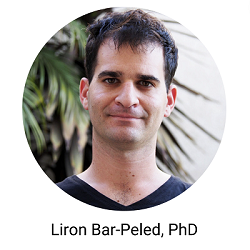NewsApr | 22 | 2024
Research Spotlight: A Huge Leap Forward for Drug Discovery in Cancer

Liron Bar-Peled, PhD, an investigator at the Krantz Family Center for Cancer Research at Massachusetts General Hospital and an associate professor of Medicine at Harvard Medical School, is the senior author of a new study in Cell, DrugMap: A Quantitative Pan-Cancer Analysis of Cysteine Ligandability.
What Problem Were You Investigating?
While there are many precision anti-cancer drugs on the market today, in aggregate they only target 10% of all cancer driver genes. We wanted to see if we could increase the number of new cancer drivers that could be targeted by uncovering what proteins were druggable across cancer.
What Was Unique About Your Approach?
We used cysteine druggability mapping, an advanced chemical protoemic approach, which tells us which cysteines (critical parts of proteins) are druggable.
To examine druggability across cancer we undertook a systematic chemical proteomic analysis of 400+ cancer cell lines representative of 25 cancer subtypes.
To aid in analyzing this data we also built out a unique computational pipeline (in collaboration with corresponding author and MGH colleague Dr. Michael Lawerence), cysteine set enrichment analysis, which told us what type of proteins are druggable and the structural aspects that make a protein druggable.
What Did You Find?
We discovered that protein druggability is heavily influenced by the environment of the cell, the conformation of the proteins and the mutations within that protein.
We leveraged this information to develop chemical probes for two incredibly challenging targets (NFkB1 and SOX10) that many believe are undruggable.
We demonstrate that the SOX10 probe is able to stop the signaling of the transcription factor in melanomas and our early pre-clinical data suggests that it can block certain melanomas from proliferating.
What Are the Clinical Implications?
We think this is a huge leap for the drug-discovery field, as many in industry (and academics) can use this atlas of protein druggability as starting point to develop new chemical probes/tool compounds, and hopefully eventually drugs.
We also hope that some of our core discoveries might help explain why in the clinic certain covalent drugs work and why they don’t work.
What Are the Next Steps?
We’re excited to continue and perform this study in tumors from patients treated here at the Mass General Cancer Center. We also think that the SOX10 inhibitor might have a path forward, so we would like to develop this.
About the Massachusetts General Hospital
Massachusetts General Hospital, founded in 1811, is the original and largest teaching hospital of Harvard Medical School. The Mass General Research Institute conducts the largest hospital-based research program in the nation, with annual research operations of more than $1 billion and comprises more than 9,500 researchers working across more than 30 institutes, centers and departments. MGH is a founding member of the Mass General Brigham healthcare system.
Type
Centers and Departments
Check out the Mass General Research Institute blog
Bench Press highlights the groundbreaking research and boundary-pushing scientists working to improve human health and fight disease.
Support Research at Mass General
Your gift helps fund groundbreaking research aimed at understanding, treating and preventing human disease.
